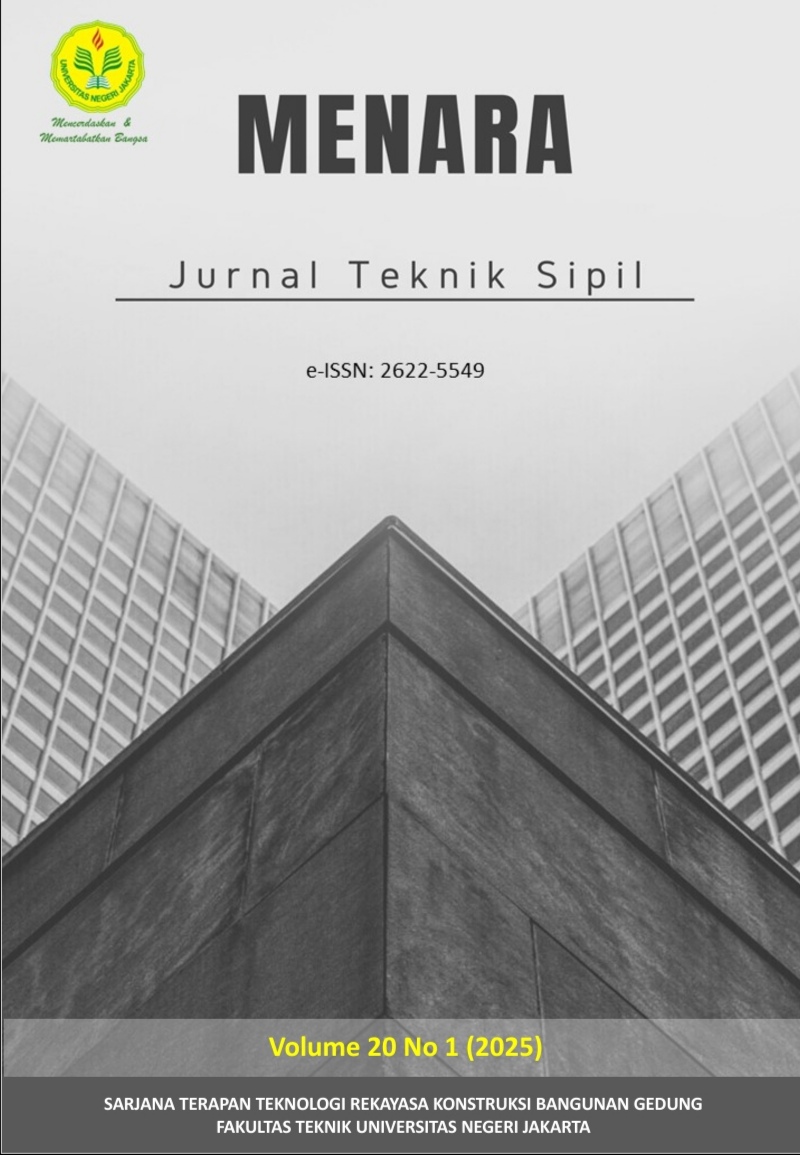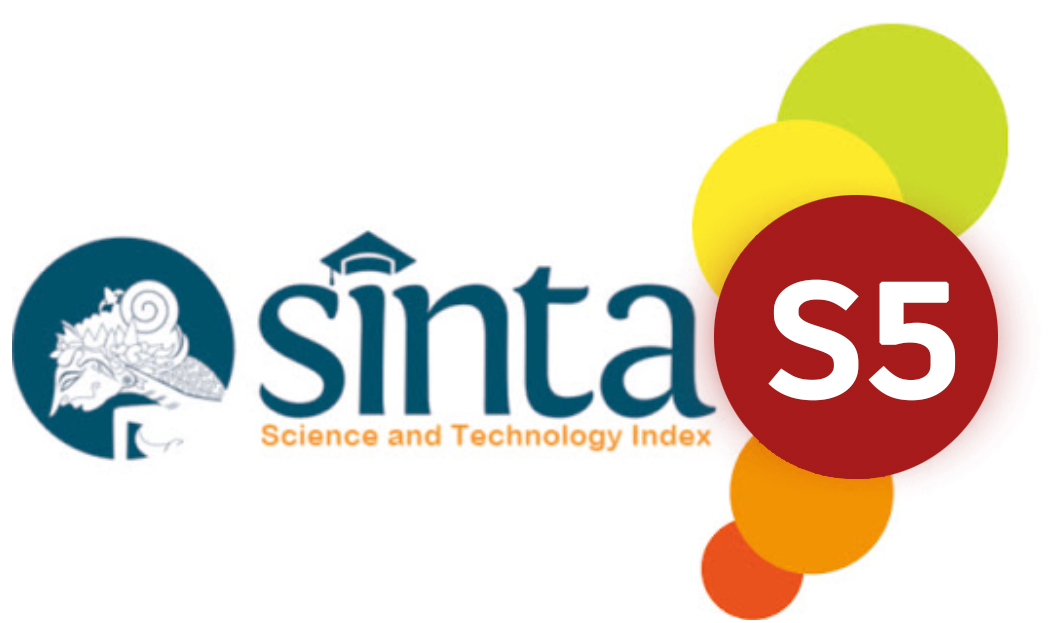Model Perhitungan Tingkat Komponen Dalam Negeri (TKDN) Pengadaan Jasa Konstruksi di Provinsi Bali
DOI:
https://doi.org/10.21009/jmenara.v20i1.48468Keywords:
Model, Nilai TKDN,Pengadaan KonstruksiAbstract
Penetapan nilai TKDN diatur pemerintah melalui kebijakan dan peraturan yang ditetapkan. Perhitungan umumnya dilakukan pada pengadaan barang dan jasa. Pengadaan konstruksi pemerintah mencakup beberapa komponen yang harus dihitung sebelum dilaksanakan proses tender yaitu RAB, spesifikasi teknis, metode pelaksanaan pekerjaan dan juga nilai TKDN. Penelitian ini akan dilaksanakan pada UKPBJ Provinsi Bali. Penelitian akan menggunakan metode deskriptif kuantitatif dan pengumpulan data dalam bentuk survey dan wawancara. Survey mengukur persentase nilai pada masing-masing variabel yang digunakan untuk menentukan nilai komponen dalam negeri jasa konstruksi. Wawancara mengetahui besaran nilai yang diterapkan pada masing-masing variabel. Wawancara dilakukan kepada Pejabat Pembuat Komitmen atau tim teknis. Analisis data menggunakan analisis modus melalui Microsoft Excel dengan memasukkan semua komponen yang dianalisis. Variabel yang digunakan untuk menghitung nilai komponen dalam negeri pekerjaan Pengadaan Jasa Konstruksi Pemerintah di Provinsi Bali adalah Analisa Harga Satuan Pekerjaan dan Nilai yang ditetapkan konsultan perencana. Model perhitungan komponen pekerjaan jasa konstruksi pemerintah Provinsi Bali setelah dianalisis menggunakan dasar analisis satuan pekerjaan dengan memperhitungkan Bahan, Material dan peralatan dengan minimal nilai komponen 40% dan Pekerja dengan 100% untuk warga lokal atau kewarganegaraan Indonesia dan Total keseluruhan nilai komponen pada pengadaan Jasa konstruksi di Provinsi Bali minimal TKDN dengan nilai 40%.
References
Agung, I. G., Putera, A., Bagus, I., Adnyana, P., Gede, I., dan Wahyudi, B. (2019). “Model Penyusunan Harga Perkiraan Sendiri (HPS) Pengadaan Barang/Jasa Pemerintah di Provinsi Bali.” Jurnal Spektran, 7(2), 204–211.
Al-Fa’izah, Z., Rahayu, Y., dan Hikmah, N. (2017). “Efektifitas Penyuluhan Gizi pada Kelompok 1000 HPK dalam Meningkatkan Pengetahuan dan Sikap Kesadaran Gizi.” Digital Repository Universitas Jember, 3(3), 69–70.
Arifin, A. S. R. (2020). “Analisis Pelaksanaan E-Tendering Jasa Konstruksi Berdasarkan Prinsip-Prinsip Pengadaan Barang dan Jasa di Perguruan Tinggi.” Cived, 7(1), 36.
Jaya, N. M., Putera, I. G. A. A., dan Simanjuntak, M. (2020). “Analisis Risiko pada Pelaksanaan Proyek Konstruksi yang Menggunakan Kontrak FIDIC di Bali.” Jurnal Spektran, 8(1), 74–83.
Nainggolan, E. M., Mardiana, S., dan Adam, A. (2023). “Implementasi Kebijakan Pengadaan Barang/Jasa Pemerintah Tentang Program Bela Pengadaan.” Publik: Jurnal Manajemen Sumber Daya Manusia, Administrasi dan Pelayanan Publik, 10(1), 1–16.
Pane, M. N., Mardiaman, M., dan Azhar, M. (2023). “Penentuan Faktor Keterlambatan Waktu Pelaksanaan Proyek APBN/APBD dengan Anggaran Tahun Tunggal untuk Mengurangi Klaim.” Menara: Jurnal Teknik Sipil, 18(2), 96–109.
Puspitawati, D. F. (2023). “Analisis Yuridis Kebijakan Tingkat Komponen Dalam Negeri (TKDN) dalam Bidang Farmasi Pada Perspektif Regulasi World Trade Organization (WTO).” Jurnal Ilmu Sosial dan Pendidikan (JISIP), 7(3), 2688–2694.
Sukindrawati, B., Kartika, W., dan Sarju, S. (2023). “Evaluasi Kinerja Waktu dengan Metode Konsep Nilai Hasil.” Menara: Jurnal Teknik Sipil, 18(2), 110–114.
Undang-Undang Republik Indonesia (2014). Undang-Undang Republik Indonesia Nomor 3 Tahun 2014 tentang Perindustrian.
Yulianti, E. (2023). “Kebijakan Tingkat Komponen Dalam Negeri (TKDN) dalam Pengadaan Barang dan Jasa Peguruan Tinggi.” Nusantara: Jurnal Ilmu Pengetahuan Sosial, 10(3), 1448–1455.
Downloads
Published
Issue
Section
License
Copyright (c) 2024 I Gede Bambang Wahyudi Bambang Wahyudi, I Wayan Sudiasa, I Gusti Putu Adi Suartika Putra, Ni Kadek Sri Ebtha Yuni, Ni Putu Indah Yuliana

This work is licensed under a Creative Commons Attribution-ShareAlike 4.0 International License.
Authors who publish with this Journal agree to the following terms:
- Author retain copyright and grant the journal right of first publication with the work simultaneously licensed under a creative commons attribution licensethat allow others to share the work within an acknowledgement of the work’s authorship and initial publication of this journal.
- Authors are able to enter into separate, additional contractual arrangementfor the non-exclusive distribution of the journal’s published version of the work (e.g. acknowledgement of its initial publication in this journal).
- Authors are permitted and encouraged to post their work online(e.g. in institutional repositories or on their websites) prior to and during the submission process, as it can lead to productive exchanges, as well as earlier and greater citation of published works.











